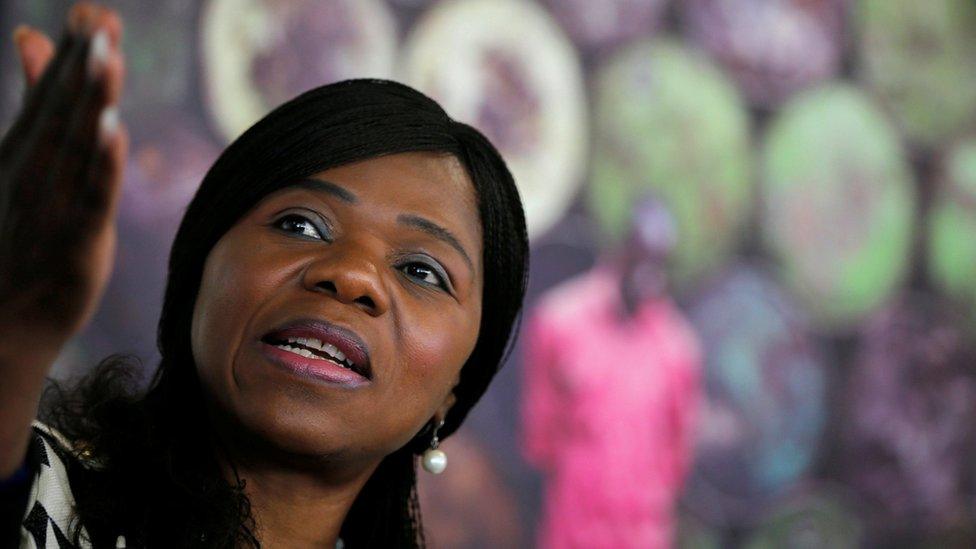South Africa: Jacob Zuma report points to possible corruption
- Published
Why marchers want Zuma to go
An investigation into South Africa's President Jacob Zuma has found evidence of possible corruption at the top level of his government.
In the report, former Public Protector Thuli Madonsela recommends Mr Zuma establish a judicial commission of inquiry within 30 days.
Mr Zuma is accused of an improper relationship with wealthy businessmen.
He had tried to block the release of the report, but dropped his court bid on Wednesday.
The president and leader of the governing African National Congress (ANC) has been dogged by corruption allegations for more than a decade, but has repeatedly denied any wrongdoing.
Police fired water cannon to disperse protesters who marched on Mr Zuma's main office in Pretoria to demand his resignation.
The 355-page report by former anti-corruption chief Thuli Madonsela is entitled "State of Capture" and is illustrated on its front page with a hand strung with puppet wires.
Deputy Finance Minister Mcebisi Jonas is quoted in the report as saying that businessman Ajay Gupta offered him 600m rand ($44.6m; £36.2m) last year, "to be deposited in an account of his choice", if he accepted the post of finance minister.
Mr Gupta also asked him if he had "a bag which he could use to receive and carry 600,000 rand in cash immediately", Mr Jonas alleged, adding that Mr Zuma's son, Duduzane, was present at the meeting.
He was expected to remove key Treasury officials from their posts and advance the Gupta family's "business ambitions", Mr Jonas is quoted as saying.
The businessman has not yet commented on the report, but has previously denied any wrongdoing.
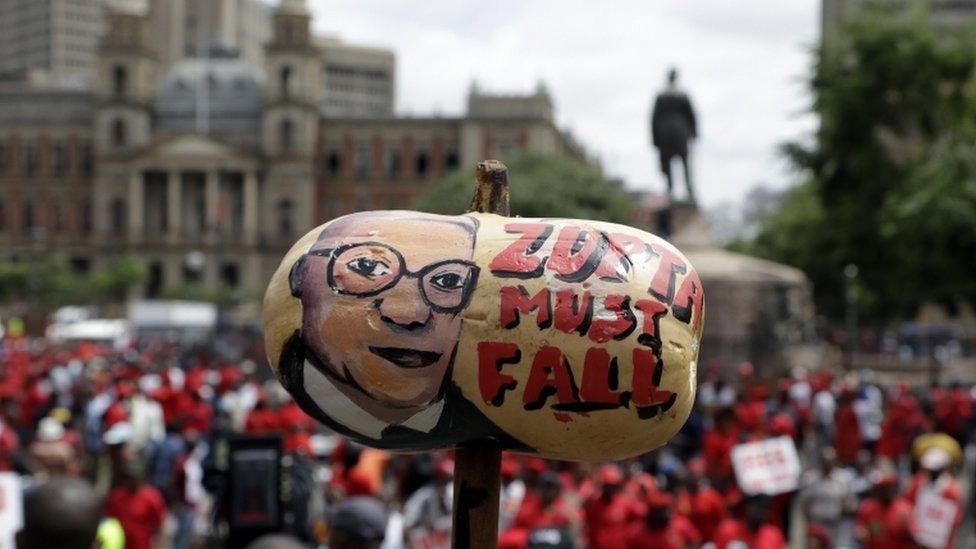
Opposition parties have repeatedly accused Mr Zuma of being corrupt, which he denies
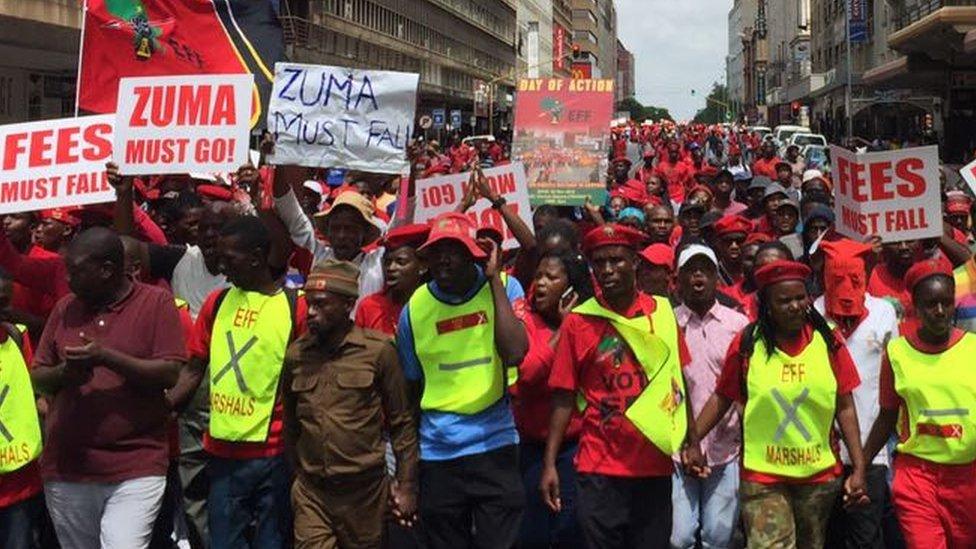
Thousands of people marched through Pretoria, chanting: Zuma must go
The Gupta family is close to President Zuma, and the two have been nicknamed by the opposition as the "Zuptas".
After Mr Jonas rejected the alleged offer, little-known ANC MP Des van Rooyen was appointed finance minister.
Ms Madonsela said she had obtained evidence, including telephone records, placing Mr Van Rooyen at the Gupta's family home on seven occasions, including the day before the appointment.
Mr Zuma was forced to sack him four days later after South Africa's currency went into a tailspin.
The report also contains allegations that:
Ajay Gupta boasted that as a family they had "made a lot of money from the state", putting the figure at 6bn rand, according to Mr Jonas
Mr Zuma told former government media chief Themba Maseko that the "Gupta brothers need your help, please help them"
Mr Gupta asked Mr Maseko to channel advertising to a newspaper the family was setting up
The board of power utility Eskom appeared to have been improperly constituted
It made payment of nearly one billion rand to a firm linked to the Guptas and the president's son
The payments may amount to "wasteful expenditure"
Eskom boss Brian Molefe and Mr Gupta made 58 telephone calls to one another between August 2015 and March 2016.
Opposition Democratic Alliance (DA) leader Musi Maimane said state coffers were being "plundered" by "crooks", but the "good guys" were winning in the battle to safeguard the democracy which emerged in South Africa at the end of minority rule in 1994.
There has not been any immediate reaction from Mr Zuma, who did not co-operate with the investigation, saying he had not been given enough time.

Will Zuma live to fight another day? Milton Nkosi, BBC News, Pretoria
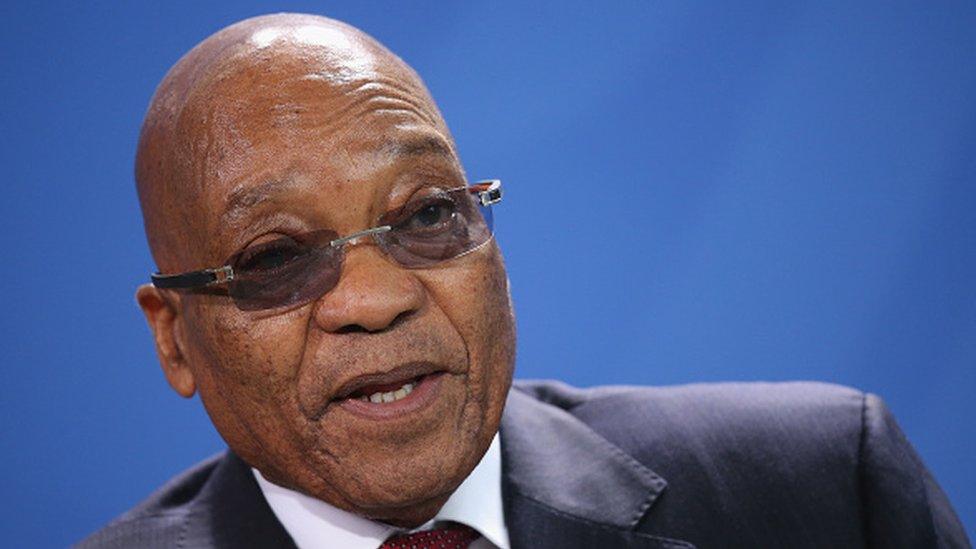
Mr Zuma is under intense pressure to resign
This report is bad for President Zuma but certainly not as damning as opposition parties and many others had hoped when they went to court.
The findings and subsequent remedial action seem to kick the can down the road. It says that the president should appoint a judicial commission of inquiry. This means that Mr Zuma would still occupy the highest office in the land for many months to come, as he slowly approaches the end of his second and last term.
There is no doubt that should the inquiry recommend that Mr Zuma be censured, there would be grounds for impeachment.
But that would present a political problem in the house of assembly because Mr Zuma's own party, the ANC, holds an overwhelming majority.
The loyal MPs have overcome many attempts by the opposition to have a vote of no confidence in the president.
Mr Zuma lives to fight another day but he must surely be nearing the last of his nine lives.

An earlier statement from the president's office said the decision to abandon a court bid to block the report's release was made "in the interest of justice and speedy resolution of the matter".
"The president will give consideration to the contents of the report in order to ascertain whether it should be a subject of a court challenge," it said.
Mr Zuma survived an impeachment vote earlier this year after South Africa's highest court upheld another finding of Ms Madonsela - that he had "unduly benefited" from government money used to upgrade his private home in the rural area of Nkandla in KwaZulu-Natal province.
Ms Madonsela stepped down as Public Protector at the end of her seven-year term last month.

The Guptas in South Africa:
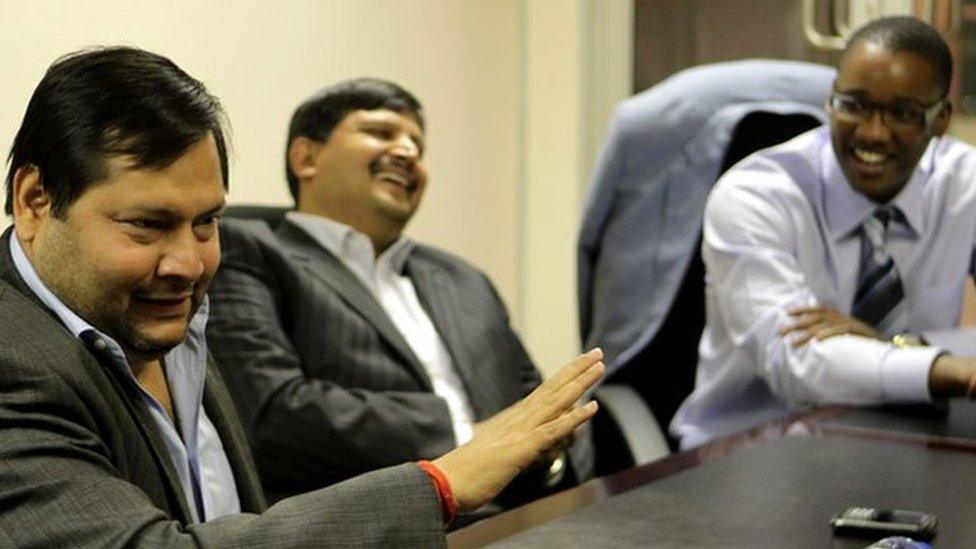
Jacob Zuma's son Duduzane (right) was a business partner of the Guptas until recently
Ajay, Atul and Rajesh Gupta moved to South Africa from India in 1993
Set up businesses in air travel, mining, energy, technology and media
Opposition nicknamed them and the president as "Zuptas" because of their close relationship
Deny influencing ministerial appointments to advance their business interests
Accused of being involved in "suspicious" transactions worth about $490m (£400m)
Say they are withdrawing from their South African businesses because of political backlash
Big banks have refused to do business with them

- Published14 February 2018
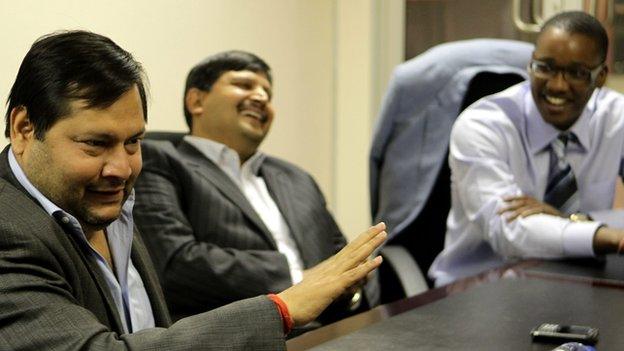
- Published31 October 2016
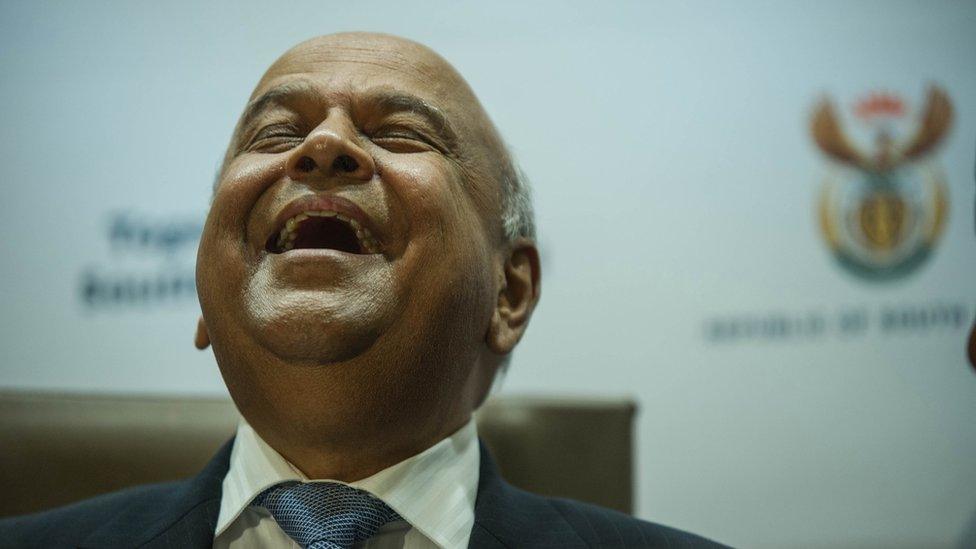
- Published14 October 2016
